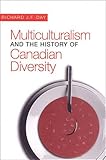Multiculturalism and the History of Canadian Diversity / Richard J.F. Day.
Material type: TextPublisher: Toronto : University of Toronto Press, [2000]Copyright date: ©2000Description: 1 online resource (288 p.)Content type:
TextPublisher: Toronto : University of Toronto Press, [2000]Copyright date: ©2000Description: 1 online resource (288 p.)Content type: - 9780802080752
- 9781442677449
- 971/.004
- F1035.A1 D39 2000eb
- online - DeGruyter
| Item type | Current library | Call number | URL | Status | Notes | Barcode | |
|---|---|---|---|---|---|---|---|
 eBook
eBook
|
Biblioteca "Angelicum" Pont. Univ. S.Tommaso d'Aquino Nuvola online | online - DeGruyter (Browse shelf(Opens below)) | Online access | Not for loan (Accesso limitato) | Accesso per gli utenti autorizzati / Access for authorized users | (dgr)9781442677449 |
Browsing Biblioteca "Angelicum" Pont. Univ. S.Tommaso d'Aquino shelves, Shelving location: Nuvola online Close shelf browser (Hides shelf browser)

|

|

|

|

|

|

|
||
| online - DeGruyter Mother Tongues and Other Reflections on the Italian Language / | online - DeGruyter Mothers and Illicit Drugs : Transcending the Myths / | online - DeGruyter Mothers of the Nation : Women, Families, and Nationalism in Twentieth-Century Europe / | online - DeGruyter Multiculturalism and the History of Canadian Diversity / | online - DeGruyter Multiple Lenses, Multiple Images : Perspectives on the Child across Time, Space, and Disciplines / | online - DeGruyter Music Discourse from Classical to Early Modern Times : Editing and Translating Texts / | online - DeGruyter Muslims in the Diaspora : The Somali Communities of London and Toronto / |
restricted access online access with authorization star
http://purl.org/coar/access_right/c_16ec
Is Canada a country of equal and peacefully coexisting identities, working towards what Charles Taylor has called a 'post-industrial Sittlichkeit'? In this analysis of the history of Canadian diversity, Richard Day argues that no degree or style of state intervention can ever bring an end to tensions related to ethnocultural relations of power.Using Foucault's method of genealogical analysis and a theory of the state form derived from the works of Deleuze and Guattari, Day creates a framework for his exploration of the construction of human difference and its management over the years. He argues that Canada's multicultural policies are propelled by a fantasy of unity based on the nation-state model. Our legislation, policies, and practices do not move us towards equality and reciprocity, he reveals, because they are rooted in a European drive to manage and control diversity.Day challenges the notion that Canadian multiculturalism represents either progress beyond a history of assimilation and genocide or a betrayal of that very history that supports the dominance of Anglo-Canadians. Only when English Canada is able to abandon its fantasy of unity, Day concludes, can the radical potential of multiculturalism politics be realized.
Mode of access: Internet via World Wide Web.
In English.
Description based on online resource; title from PDF title page (publisher's Web site, viewed 01. Nov 2023)


